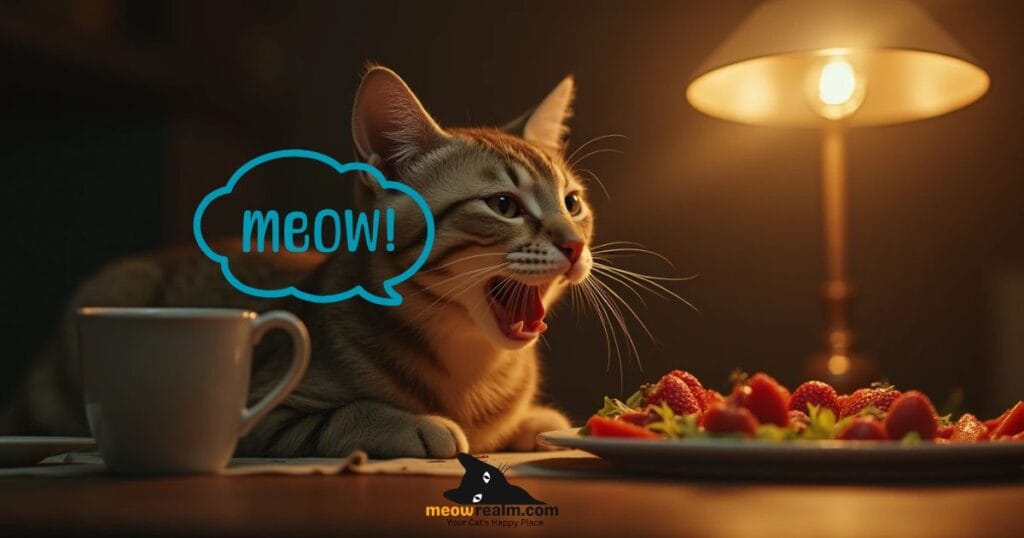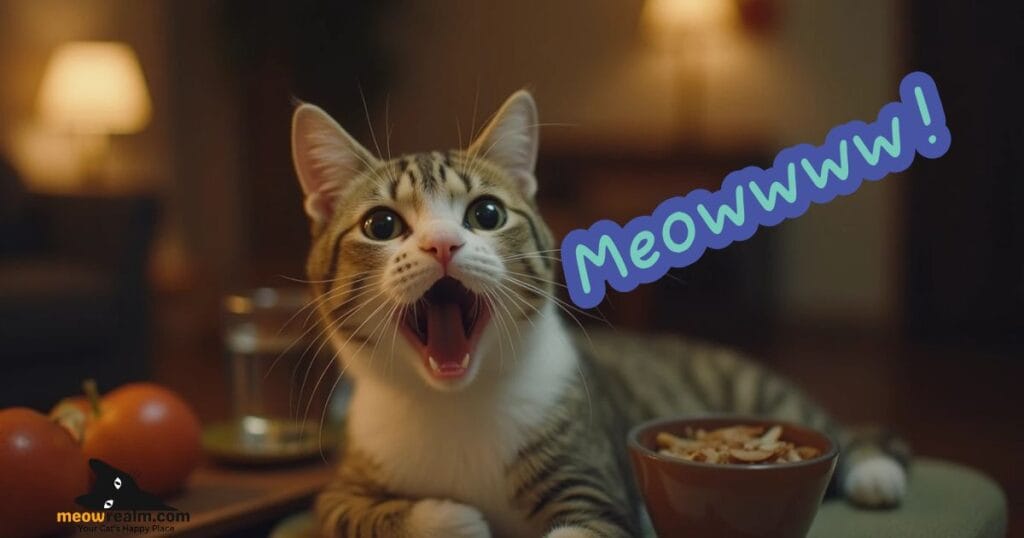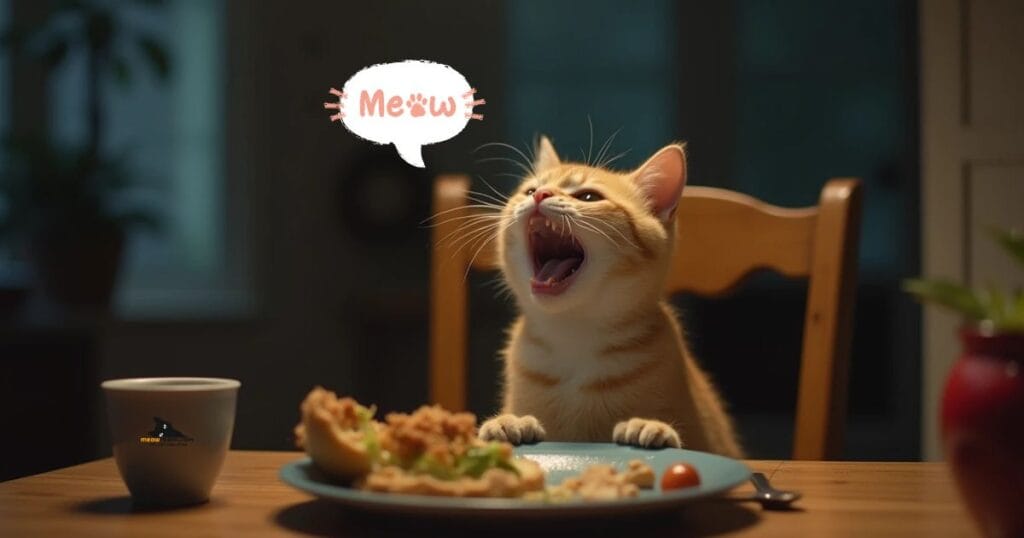Have you ever noticed your cat meowing right after they’ve finished a meal? This may seem like a quirky habit, but it actually reveals quite a bit about your cat’s emotions, health, and unique personality. If you’re wondering, “Why does my cat meow after eating?” you’re not alone. Many cat owners experience this, and in most cases, post-meal meowing is a normal behavior. In this article, we’ll dive into the reasons behind this behavior, how to interpret it, and what steps you can take to ensure your cat is happy and healthy. Whether it’s a simple expression of contentment or a signal for something more, we’ll explore all you need to know about your cat’s meows after mealtime.
Table of Contents

Understanding Cat Behavior: Why Do Cats Meow?
A Brief Overview of Cat Vocalizations / does my cat meow after eating
Cats are known for their diverse and expressive vocalizations, which range from gentle purrs to loud, attention-grabbing meows. Unlike dogs, cats primarily developed their vocalizations as a way to communicate with humans rather than each other. A cat’s meow can signify many things, including hunger, excitement, attention-seeking, or discomfort. Observing your cat’s vocal patterns and behaviors can give you insight into what they’re trying to communicate.
How Domestic Cats Evolved to Communicate / does my cat meow after eating
Over time, domesticated cats have adapted to rely on humans for food, shelter, and companionship. This has transformed their vocal patterns, allowing them to connect with us more effectively. Unlike wild cats, who communicate primarily through body language, domesticated cats often use meows to convey their needs to their human caregivers.

Reasons Why Your Cat Might Meow After Eating / does my cat meow after eating
Hunger vs. Habit
One of the simplest explanations for post-meal meowing is habit. If you’ve always responded to your cat’s meows around feeding time, they may associate meowing with getting food. Cats are creatures of routine and will often meow out of habit if they’ve come to expect a particular response. Additionally, if your cat meows after eating, it could be because they’re not entirely satisfied with their meal or still feel a bit hungry. In these cases, adjusting their portion sizes or switching to a more filling diet may help.
Expression of Contentment
For many cats, meowing after a meal is a form of expression, similar to a satisfied sigh or a quick “thank you.” Some cats will meow to let you know they’re pleased and content. This vocalization can also signify a bonding moment, as your cat associates you with the satisfaction of their appetite. If your cat’s post-meal meows sound more like a gentle chirp or purr, it’s likely they’re simply expressing their satisfaction.
Seeking Attention
Cats are social animals, and many will meow after eating as a way to engage with you. For some, mealtime is a comforting ritual, and they may meow afterward to initiate playtime, petting, or simply a little extra affection. If your cat meows immediately after eating and then follows you around, they’re likely looking for a bit of companionship. Responding with some gentle petting or even a quick play session can reinforce positive associations with their mealtime experience.
Discomfort or Digestive Issues
In some cases, meowing after eating may indicate mild digestive discomfort. If you notice that your cat’s meowing is accompanied by signs like restlessness, avoiding lying down, or licking their lips, they may be experiencing a mild tummy ache. Certain foods, especially those that are very rich, can sometimes cause cats slight discomfort, leading them to vocalize after eating. If this behavior is new or has become frequent, consider adjusting your cat’s diet or speaking to a vet for advice on more digestible food options.
Possible Health Concerns
How to Respond to Your Cat’s Meowing After Eating / does my cat meow after eating
Observing Patterns
Tracking your cat’s behavior around mealtime can provide helpful insights. Try keeping a journal that notes feeding times, meal portions, and any meowing that follows. Over time, you may notice patterns that indicate whether your cat’s meowing is linked to certain food types, times of day, or environmental changes.
Adjusting Their Diet
If you suspect that your cat’s meowing is due to hunger or minor digestive discomfort, consider adjusting their diet. You might increase their portion size slightly, try a different food formula, or offer a more filling option. Cats have different nutritional needs at various life stages, so if your cat is older or has specific health needs, you may benefit from consulting a vet to ensure they’re on the best diet for their age and condition.
Balancing Attention with Boundaries
It’s natural to want to give your cat extra attention, especially if they’re meowing after meals. However, setting boundaries can help prevent your cat from associating mealtime with constant attention-seeking. Offering a few minutes of petting after feeding can provide affection without reinforcing the habit of meowing excessively.
Pros and Cons of Your Cat’s Post-Meal Meowing
Pros: does my cat meow after eating
- Indicates Contentment: Post-meal meowing often shows that your cat is happy and comfortable.
- Encourages Bonding: Many cats meow after eating to engage with you, which can be a positive bonding moment.
- Can Serve as a Health Indicator: Monitoring meowing patterns can help you detect if something’s amiss in their diet or health.
Cons: does my cat meow after eating
- Possible Digestive Issues: Meowing might indicate mild digestive issues that need to be addressed.
- Encourages Habitual Meowing: If reinforced too often, cats may meow persistently, expecting attention or extra food.

FAQ: Common Questions About Cats Meowing After Eating
Why does my cat meow after eating only certain types of food?
Cats can be sensitive to certain ingredients. If your cat meows after specific meals, it may be due to the way particular foods impact their digestion or taste preference.
Is post-meal meowing normal for older cats?
Yes, it’s normal, though excessive meowing in older cats might hint at issues like dental discomfort, or digestive concerns.
Should I ignore my cat’s meowing after meals?
It depends. Acknowledge their meowing, but avoid excessive reinforcement if they’re simply seeking attention. If it’s persistent, monitor for other symptoms that could suggest discomfort.
Post-meal meowing in cats can mean different things, from expressing satisfaction to hinting at mild discomfort. Understanding your cat’s specific habits and vocal cues allows you to respond appropriately, strengthening your bond and ensuring your cat’s well-being. Keep in mind that this behavior is often normal and even endearing, but it’s essential to monitor any changes or signs of discomfort. By understanding and responding to your cat’s post-meal meowing, you’re helping to create a happier, more contented environment for your feline friend.
does my cat meow after eating
Why does my cat meow after eating
Cat meowing after eating
Cat behavior after eating
Reasons cats meow after meals
Cat digestive issues meowing
Post-meal meowing in cats
Cat meows for attention after eating
Cat meowing contentment after eating
Is it normal for cats to meow after eating
How to respond to cat meowing after meals

